Case Study Analysis: Market Imperfection, Failure, and Sugar Tax
VerifiedAdded on 2020/10/05
|8
|2111
|470
Case Study
AI Summary
This case study in business economics delves into the impact of market imperfections and market failures on entrepreneurship, labor, and financial products. It explores how these factors influence management, decision-making, and the overall functioning of businesses. The study also analyzes the effects of sugar tax policies, implemented by the UK government to reduce sugar consumption, on business strategies and managerial decisions. It examines the tax's impact on the soft drink industry, its influence on government revenues, and its broader implications for the UK's economy, including changes in import and export dynamics. The case study concludes by summarizing the interplay between market dynamics, government policies, and their consequences on various business aspects, offering insights into the complexities of economic decision-making and policy implementation.
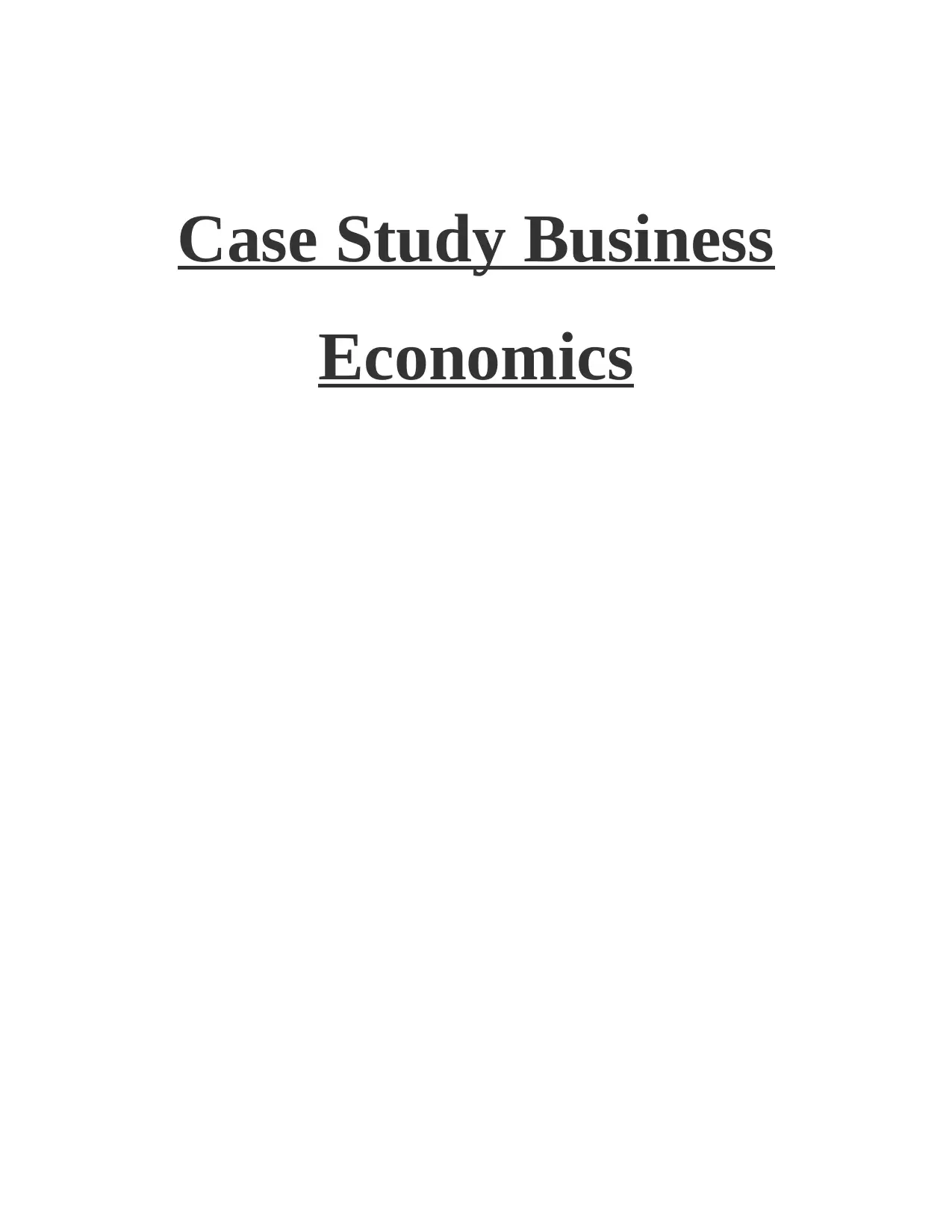
Case Study Business
Economics
Economics
Paraphrase This Document
Need a fresh take? Get an instant paraphrase of this document with our AI Paraphraser
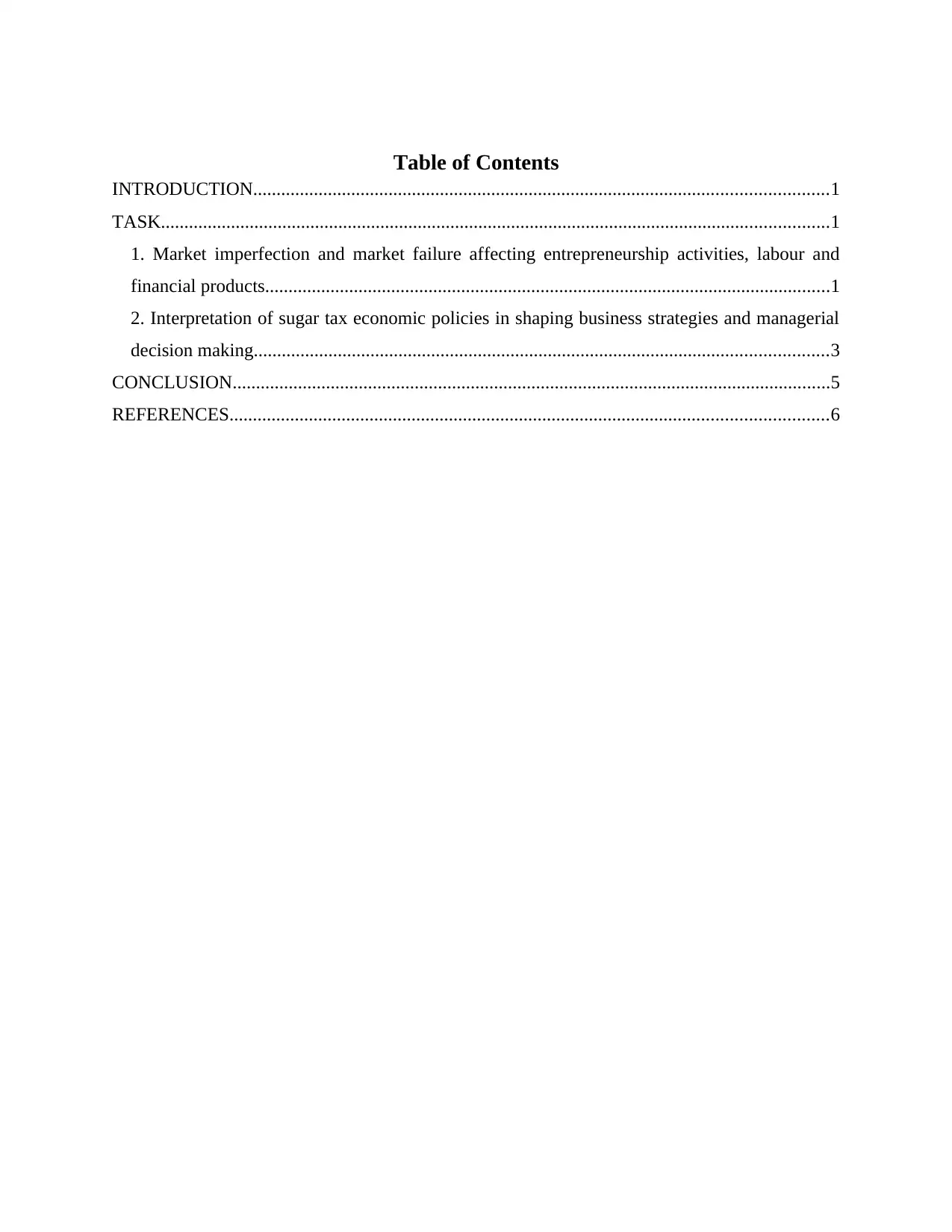
Table of Contents
INTRODUCTION...........................................................................................................................1
TASK...............................................................................................................................................1
1. Market imperfection and market failure affecting entrepreneurship activities, labour and
financial products.........................................................................................................................1
2. Interpretation of sugar tax economic policies in shaping business strategies and managerial
decision making...........................................................................................................................3
CONCLUSION................................................................................................................................5
REFERENCES................................................................................................................................6
INTRODUCTION...........................................................................................................................1
TASK...............................................................................................................................................1
1. Market imperfection and market failure affecting entrepreneurship activities, labour and
financial products.........................................................................................................................1
2. Interpretation of sugar tax economic policies in shaping business strategies and managerial
decision making...........................................................................................................................3
CONCLUSION................................................................................................................................5
REFERENCES................................................................................................................................6
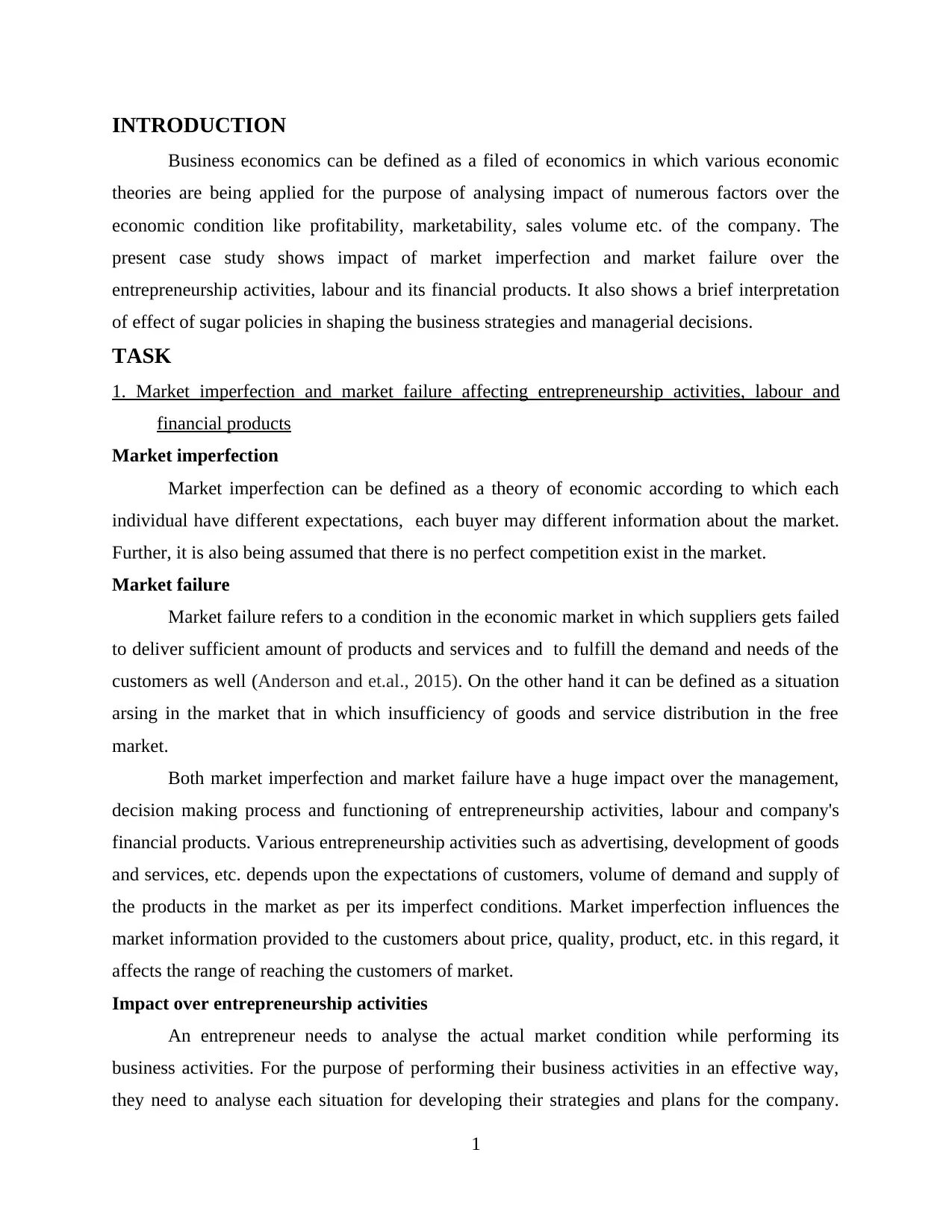
INTRODUCTION
Business economics can be defined as a filed of economics in which various economic
theories are being applied for the purpose of analysing impact of numerous factors over the
economic condition like profitability, marketability, sales volume etc. of the company. The
present case study shows impact of market imperfection and market failure over the
entrepreneurship activities, labour and its financial products. It also shows a brief interpretation
of effect of sugar policies in shaping the business strategies and managerial decisions.
TASK
1. Market imperfection and market failure affecting entrepreneurship activities, labour and
financial products
Market imperfection
Market imperfection can be defined as a theory of economic according to which each
individual have different expectations, each buyer may different information about the market.
Further, it is also being assumed that there is no perfect competition exist in the market.
Market failure
Market failure refers to a condition in the economic market in which suppliers gets failed
to deliver sufficient amount of products and services and to fulfill the demand and needs of the
customers as well (Anderson and et.al., 2015). On the other hand it can be defined as a situation
arsing in the market that in which insufficiency of goods and service distribution in the free
market.
Both market imperfection and market failure have a huge impact over the management,
decision making process and functioning of entrepreneurship activities, labour and company's
financial products. Various entrepreneurship activities such as advertising, development of goods
and services, etc. depends upon the expectations of customers, volume of demand and supply of
the products in the market as per its imperfect conditions. Market imperfection influences the
market information provided to the customers about price, quality, product, etc. in this regard, it
affects the range of reaching the customers of market.
Impact over entrepreneurship activities
An entrepreneur needs to analyse the actual market condition while performing its
business activities. For the purpose of performing their business activities in an effective way,
they need to analyse each situation for developing their strategies and plans for the company.
1
Business economics can be defined as a filed of economics in which various economic
theories are being applied for the purpose of analysing impact of numerous factors over the
economic condition like profitability, marketability, sales volume etc. of the company. The
present case study shows impact of market imperfection and market failure over the
entrepreneurship activities, labour and its financial products. It also shows a brief interpretation
of effect of sugar policies in shaping the business strategies and managerial decisions.
TASK
1. Market imperfection and market failure affecting entrepreneurship activities, labour and
financial products
Market imperfection
Market imperfection can be defined as a theory of economic according to which each
individual have different expectations, each buyer may different information about the market.
Further, it is also being assumed that there is no perfect competition exist in the market.
Market failure
Market failure refers to a condition in the economic market in which suppliers gets failed
to deliver sufficient amount of products and services and to fulfill the demand and needs of the
customers as well (Anderson and et.al., 2015). On the other hand it can be defined as a situation
arsing in the market that in which insufficiency of goods and service distribution in the free
market.
Both market imperfection and market failure have a huge impact over the management,
decision making process and functioning of entrepreneurship activities, labour and company's
financial products. Various entrepreneurship activities such as advertising, development of goods
and services, etc. depends upon the expectations of customers, volume of demand and supply of
the products in the market as per its imperfect conditions. Market imperfection influences the
market information provided to the customers about price, quality, product, etc. in this regard, it
affects the range of reaching the customers of market.
Impact over entrepreneurship activities
An entrepreneur needs to analyse the actual market condition while performing its
business activities. For the purpose of performing their business activities in an effective way,
they need to analyse each situation for developing their strategies and plans for the company.
1
⊘ This is a preview!⊘
Do you want full access?
Subscribe today to unlock all pages.

Trusted by 1+ million students worldwide
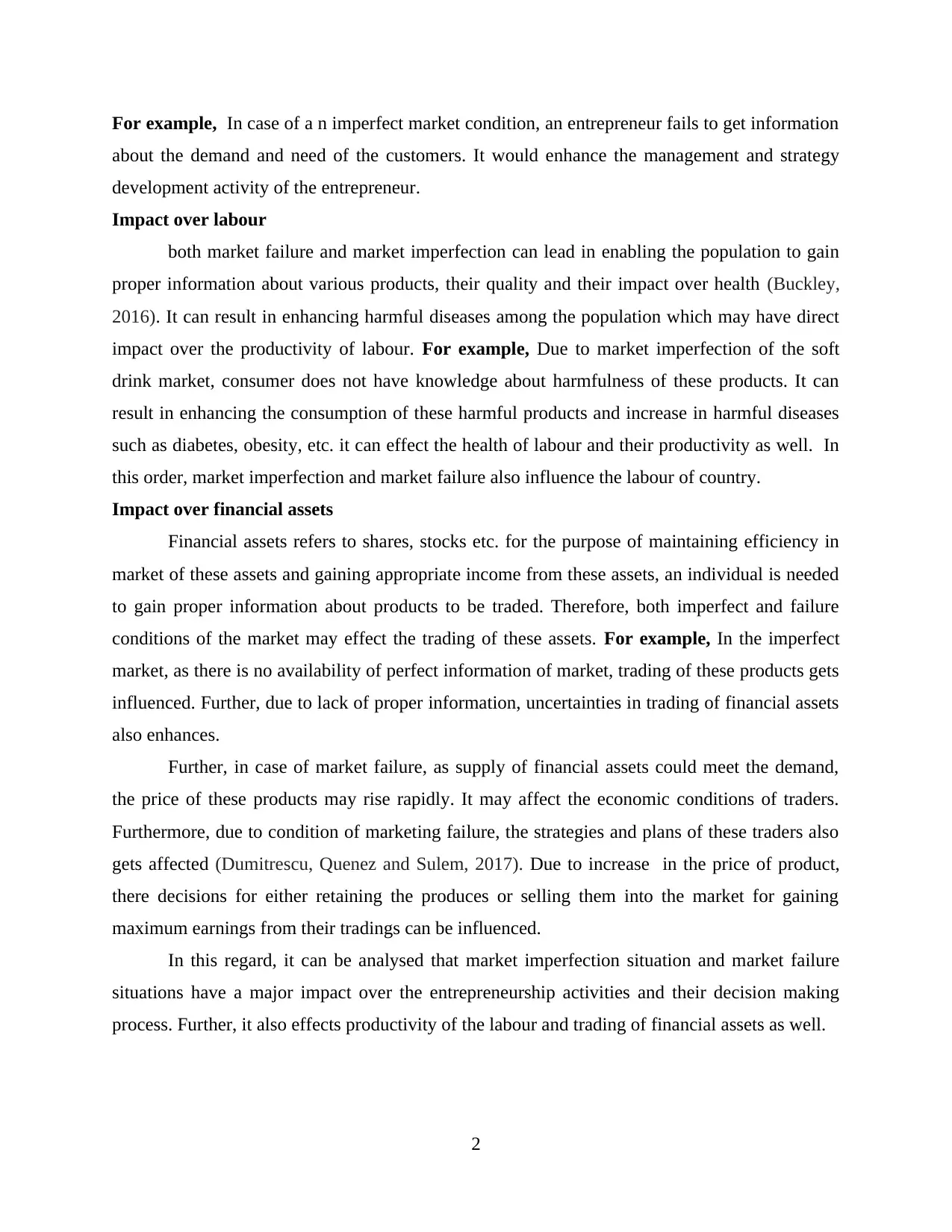
For example, In case of a n imperfect market condition, an entrepreneur fails to get information
about the demand and need of the customers. It would enhance the management and strategy
development activity of the entrepreneur.
Impact over labour
both market failure and market imperfection can lead in enabling the population to gain
proper information about various products, their quality and their impact over health (Buckley,
2016). It can result in enhancing harmful diseases among the population which may have direct
impact over the productivity of labour. For example, Due to market imperfection of the soft
drink market, consumer does not have knowledge about harmfulness of these products. It can
result in enhancing the consumption of these harmful products and increase in harmful diseases
such as diabetes, obesity, etc. it can effect the health of labour and their productivity as well. In
this order, market imperfection and market failure also influence the labour of country.
Impact over financial assets
Financial assets refers to shares, stocks etc. for the purpose of maintaining efficiency in
market of these assets and gaining appropriate income from these assets, an individual is needed
to gain proper information about products to be traded. Therefore, both imperfect and failure
conditions of the market may effect the trading of these assets. For example, In the imperfect
market, as there is no availability of perfect information of market, trading of these products gets
influenced. Further, due to lack of proper information, uncertainties in trading of financial assets
also enhances.
Further, in case of market failure, as supply of financial assets could meet the demand,
the price of these products may rise rapidly. It may affect the economic conditions of traders.
Furthermore, due to condition of marketing failure, the strategies and plans of these traders also
gets affected (Dumitrescu, Quenez and Sulem, 2017). Due to increase in the price of product,
there decisions for either retaining the produces or selling them into the market for gaining
maximum earnings from their tradings can be influenced.
In this regard, it can be analysed that market imperfection situation and market failure
situations have a major impact over the entrepreneurship activities and their decision making
process. Further, it also effects productivity of the labour and trading of financial assets as well.
2
about the demand and need of the customers. It would enhance the management and strategy
development activity of the entrepreneur.
Impact over labour
both market failure and market imperfection can lead in enabling the population to gain
proper information about various products, their quality and their impact over health (Buckley,
2016). It can result in enhancing harmful diseases among the population which may have direct
impact over the productivity of labour. For example, Due to market imperfection of the soft
drink market, consumer does not have knowledge about harmfulness of these products. It can
result in enhancing the consumption of these harmful products and increase in harmful diseases
such as diabetes, obesity, etc. it can effect the health of labour and their productivity as well. In
this order, market imperfection and market failure also influence the labour of country.
Impact over financial assets
Financial assets refers to shares, stocks etc. for the purpose of maintaining efficiency in
market of these assets and gaining appropriate income from these assets, an individual is needed
to gain proper information about products to be traded. Therefore, both imperfect and failure
conditions of the market may effect the trading of these assets. For example, In the imperfect
market, as there is no availability of perfect information of market, trading of these products gets
influenced. Further, due to lack of proper information, uncertainties in trading of financial assets
also enhances.
Further, in case of market failure, as supply of financial assets could meet the demand,
the price of these products may rise rapidly. It may affect the economic conditions of traders.
Furthermore, due to condition of marketing failure, the strategies and plans of these traders also
gets affected (Dumitrescu, Quenez and Sulem, 2017). Due to increase in the price of product,
there decisions for either retaining the produces or selling them into the market for gaining
maximum earnings from their tradings can be influenced.
In this regard, it can be analysed that market imperfection situation and market failure
situations have a major impact over the entrepreneurship activities and their decision making
process. Further, it also effects productivity of the labour and trading of financial assets as well.
2
Paraphrase This Document
Need a fresh take? Get an instant paraphrase of this document with our AI Paraphraser
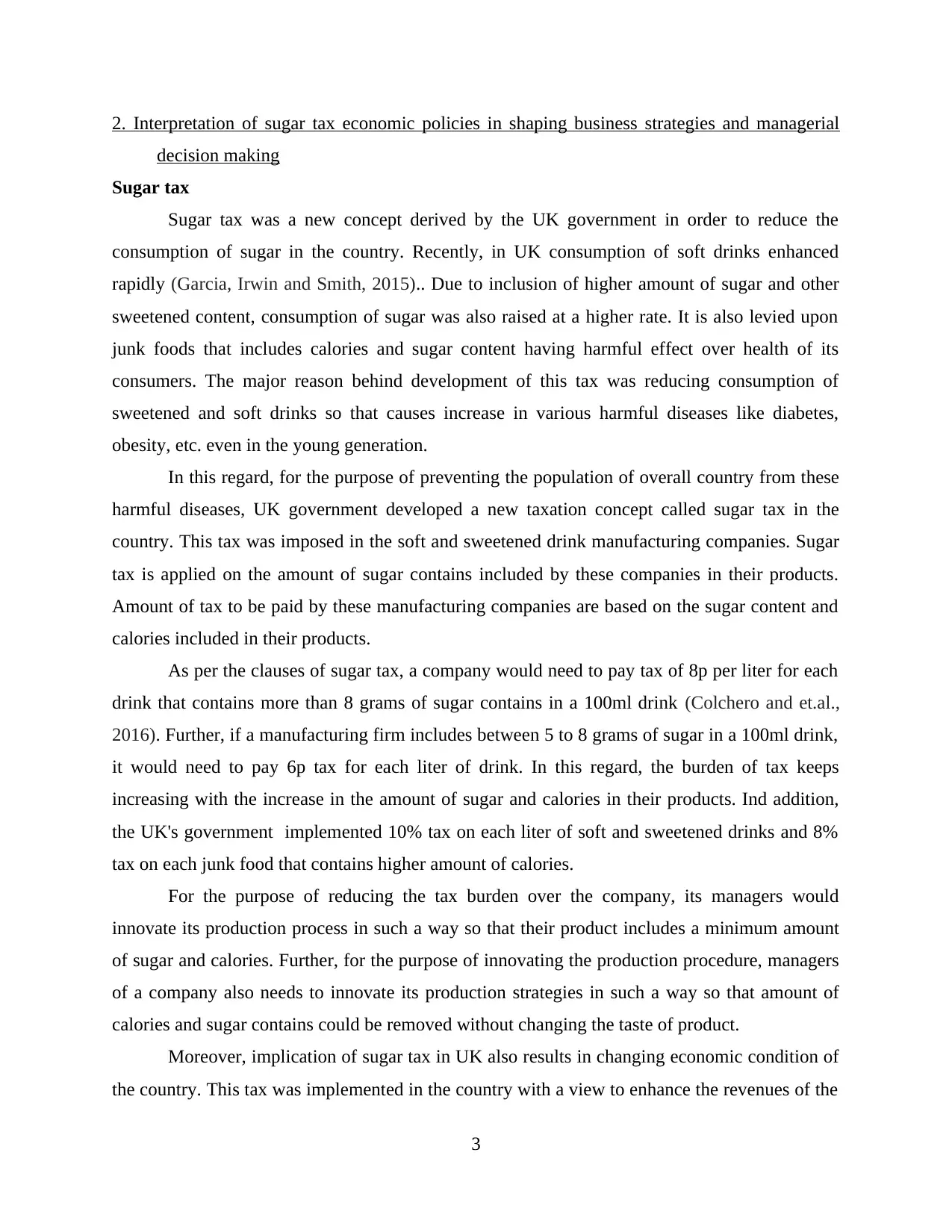
2. Interpretation of sugar tax economic policies in shaping business strategies and managerial
decision making
Sugar tax
Sugar tax was a new concept derived by the UK government in order to reduce the
consumption of sugar in the country. Recently, in UK consumption of soft drinks enhanced
rapidly (Garcia, Irwin and Smith, 2015).. Due to inclusion of higher amount of sugar and other
sweetened content, consumption of sugar was also raised at a higher rate. It is also levied upon
junk foods that includes calories and sugar content having harmful effect over health of its
consumers. The major reason behind development of this tax was reducing consumption of
sweetened and soft drinks so that causes increase in various harmful diseases like diabetes,
obesity, etc. even in the young generation.
In this regard, for the purpose of preventing the population of overall country from these
harmful diseases, UK government developed a new taxation concept called sugar tax in the
country. This tax was imposed in the soft and sweetened drink manufacturing companies. Sugar
tax is applied on the amount of sugar contains included by these companies in their products.
Amount of tax to be paid by these manufacturing companies are based on the sugar content and
calories included in their products.
As per the clauses of sugar tax, a company would need to pay tax of 8p per liter for each
drink that contains more than 8 grams of sugar contains in a 100ml drink (Colchero and et.al.,
2016). Further, if a manufacturing firm includes between 5 to 8 grams of sugar in a 100ml drink,
it would need to pay 6p tax for each liter of drink. In this regard, the burden of tax keeps
increasing with the increase in the amount of sugar and calories in their products. Ind addition,
the UK's government implemented 10% tax on each liter of soft and sweetened drinks and 8%
tax on each junk food that contains higher amount of calories.
For the purpose of reducing the tax burden over the company, its managers would
innovate its production process in such a way so that their product includes a minimum amount
of sugar and calories. Further, for the purpose of innovating the production procedure, managers
of a company also needs to innovate its production strategies in such a way so that amount of
calories and sugar contains could be removed without changing the taste of product.
Moreover, implication of sugar tax in UK also results in changing economic condition of
the country. This tax was implemented in the country with a view to enhance the revenues of the
3
decision making
Sugar tax
Sugar tax was a new concept derived by the UK government in order to reduce the
consumption of sugar in the country. Recently, in UK consumption of soft drinks enhanced
rapidly (Garcia, Irwin and Smith, 2015).. Due to inclusion of higher amount of sugar and other
sweetened content, consumption of sugar was also raised at a higher rate. It is also levied upon
junk foods that includes calories and sugar content having harmful effect over health of its
consumers. The major reason behind development of this tax was reducing consumption of
sweetened and soft drinks so that causes increase in various harmful diseases like diabetes,
obesity, etc. even in the young generation.
In this regard, for the purpose of preventing the population of overall country from these
harmful diseases, UK government developed a new taxation concept called sugar tax in the
country. This tax was imposed in the soft and sweetened drink manufacturing companies. Sugar
tax is applied on the amount of sugar contains included by these companies in their products.
Amount of tax to be paid by these manufacturing companies are based on the sugar content and
calories included in their products.
As per the clauses of sugar tax, a company would need to pay tax of 8p per liter for each
drink that contains more than 8 grams of sugar contains in a 100ml drink (Colchero and et.al.,
2016). Further, if a manufacturing firm includes between 5 to 8 grams of sugar in a 100ml drink,
it would need to pay 6p tax for each liter of drink. In this regard, the burden of tax keeps
increasing with the increase in the amount of sugar and calories in their products. Ind addition,
the UK's government implemented 10% tax on each liter of soft and sweetened drinks and 8%
tax on each junk food that contains higher amount of calories.
For the purpose of reducing the tax burden over the company, its managers would
innovate its production process in such a way so that their product includes a minimum amount
of sugar and calories. Further, for the purpose of innovating the production procedure, managers
of a company also needs to innovate its production strategies in such a way so that amount of
calories and sugar contains could be removed without changing the taste of product.
Moreover, implication of sugar tax in UK also results in changing economic condition of
the country. This tax was implemented in the country with a view to enhance the revenues of the
3
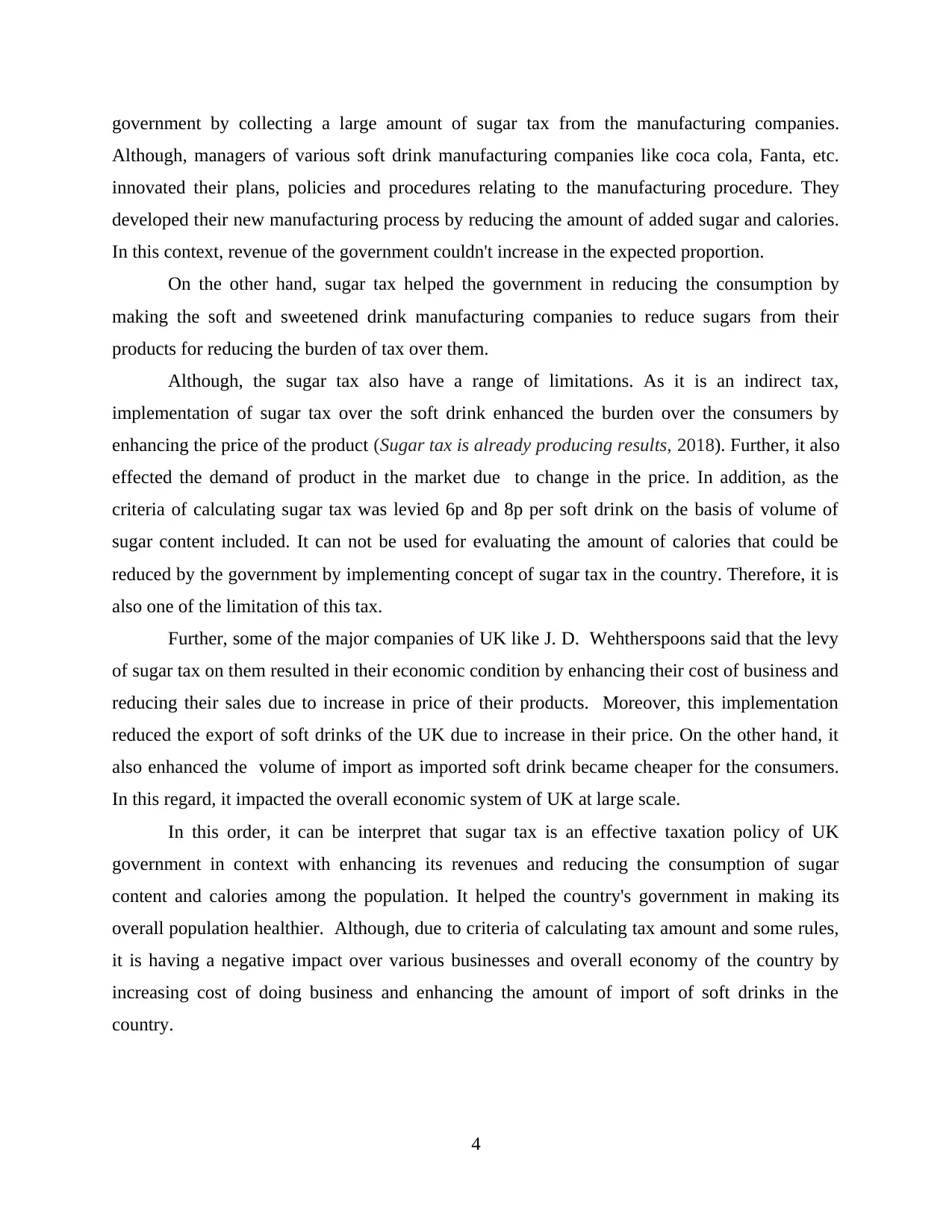
government by collecting a large amount of sugar tax from the manufacturing companies.
Although, managers of various soft drink manufacturing companies like coca cola, Fanta, etc.
innovated their plans, policies and procedures relating to the manufacturing procedure. They
developed their new manufacturing process by reducing the amount of added sugar and calories.
In this context, revenue of the government couldn't increase in the expected proportion.
On the other hand, sugar tax helped the government in reducing the consumption by
making the soft and sweetened drink manufacturing companies to reduce sugars from their
products for reducing the burden of tax over them.
Although, the sugar tax also have a range of limitations. As it is an indirect tax,
implementation of sugar tax over the soft drink enhanced the burden over the consumers by
enhancing the price of the product (Sugar tax is already producing results, 2018). Further, it also
effected the demand of product in the market due to change in the price. In addition, as the
criteria of calculating sugar tax was levied 6p and 8p per soft drink on the basis of volume of
sugar content included. It can not be used for evaluating the amount of calories that could be
reduced by the government by implementing concept of sugar tax in the country. Therefore, it is
also one of the limitation of this tax.
Further, some of the major companies of UK like J. D. Wehtherspoons said that the levy
of sugar tax on them resulted in their economic condition by enhancing their cost of business and
reducing their sales due to increase in price of their products. Moreover, this implementation
reduced the export of soft drinks of the UK due to increase in their price. On the other hand, it
also enhanced the volume of import as imported soft drink became cheaper for the consumers.
In this regard, it impacted the overall economic system of UK at large scale.
In this order, it can be interpret that sugar tax is an effective taxation policy of UK
government in context with enhancing its revenues and reducing the consumption of sugar
content and calories among the population. It helped the country's government in making its
overall population healthier. Although, due to criteria of calculating tax amount and some rules,
it is having a negative impact over various businesses and overall economy of the country by
increasing cost of doing business and enhancing the amount of import of soft drinks in the
country.
4
Although, managers of various soft drink manufacturing companies like coca cola, Fanta, etc.
innovated their plans, policies and procedures relating to the manufacturing procedure. They
developed their new manufacturing process by reducing the amount of added sugar and calories.
In this context, revenue of the government couldn't increase in the expected proportion.
On the other hand, sugar tax helped the government in reducing the consumption by
making the soft and sweetened drink manufacturing companies to reduce sugars from their
products for reducing the burden of tax over them.
Although, the sugar tax also have a range of limitations. As it is an indirect tax,
implementation of sugar tax over the soft drink enhanced the burden over the consumers by
enhancing the price of the product (Sugar tax is already producing results, 2018). Further, it also
effected the demand of product in the market due to change in the price. In addition, as the
criteria of calculating sugar tax was levied 6p and 8p per soft drink on the basis of volume of
sugar content included. It can not be used for evaluating the amount of calories that could be
reduced by the government by implementing concept of sugar tax in the country. Therefore, it is
also one of the limitation of this tax.
Further, some of the major companies of UK like J. D. Wehtherspoons said that the levy
of sugar tax on them resulted in their economic condition by enhancing their cost of business and
reducing their sales due to increase in price of their products. Moreover, this implementation
reduced the export of soft drinks of the UK due to increase in their price. On the other hand, it
also enhanced the volume of import as imported soft drink became cheaper for the consumers.
In this regard, it impacted the overall economic system of UK at large scale.
In this order, it can be interpret that sugar tax is an effective taxation policy of UK
government in context with enhancing its revenues and reducing the consumption of sugar
content and calories among the population. It helped the country's government in making its
overall population healthier. Although, due to criteria of calculating tax amount and some rules,
it is having a negative impact over various businesses and overall economy of the country by
increasing cost of doing business and enhancing the amount of import of soft drinks in the
country.
4
⊘ This is a preview!⊘
Do you want full access?
Subscribe today to unlock all pages.

Trusted by 1+ million students worldwide
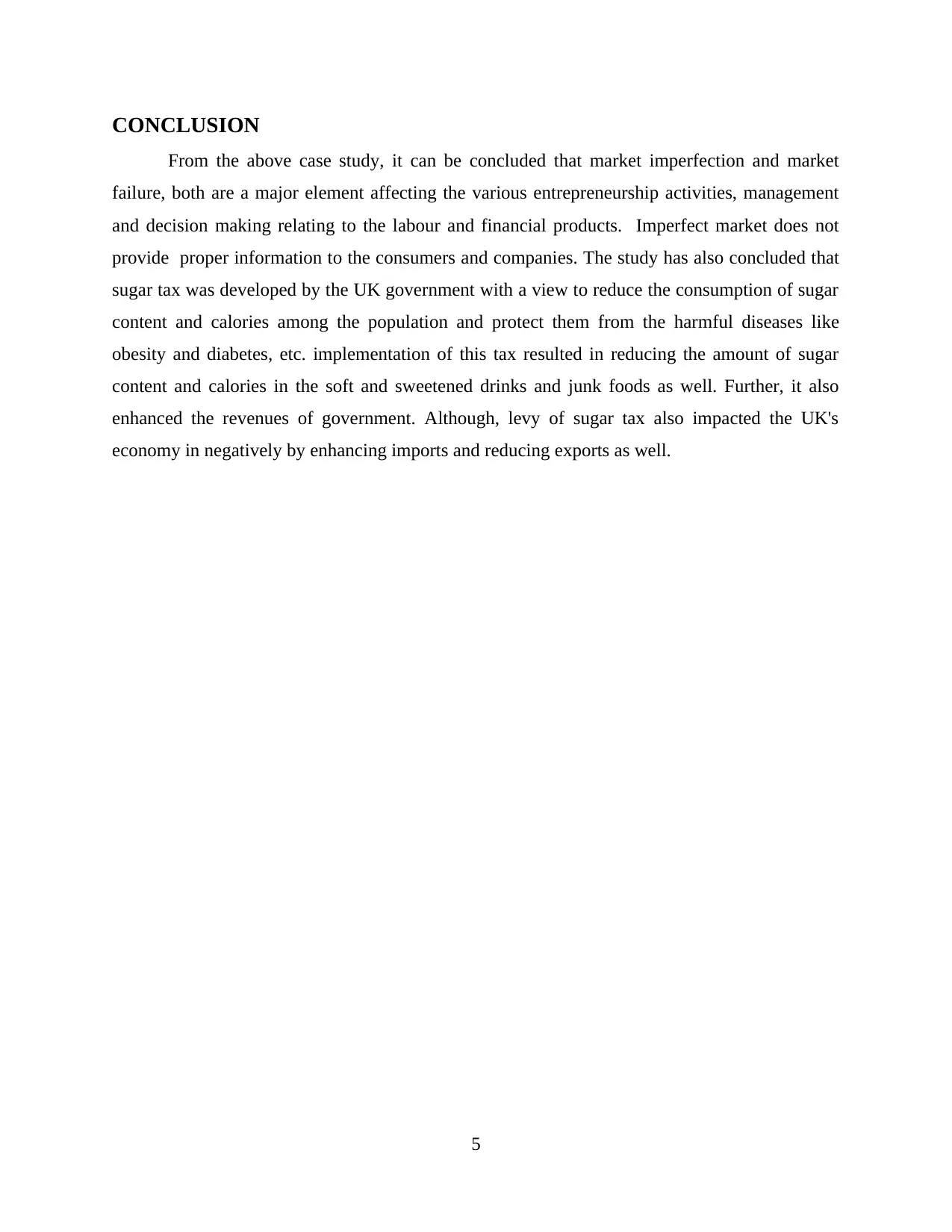
CONCLUSION
From the above case study, it can be concluded that market imperfection and market
failure, both are a major element affecting the various entrepreneurship activities, management
and decision making relating to the labour and financial products. Imperfect market does not
provide proper information to the consumers and companies. The study has also concluded that
sugar tax was developed by the UK government with a view to reduce the consumption of sugar
content and calories among the population and protect them from the harmful diseases like
obesity and diabetes, etc. implementation of this tax resulted in reducing the amount of sugar
content and calories in the soft and sweetened drinks and junk foods as well. Further, it also
enhanced the revenues of government. Although, levy of sugar tax also impacted the UK's
economy in negatively by enhancing imports and reducing exports as well.
5
From the above case study, it can be concluded that market imperfection and market
failure, both are a major element affecting the various entrepreneurship activities, management
and decision making relating to the labour and financial products. Imperfect market does not
provide proper information to the consumers and companies. The study has also concluded that
sugar tax was developed by the UK government with a view to reduce the consumption of sugar
content and calories among the population and protect them from the harmful diseases like
obesity and diabetes, etc. implementation of this tax resulted in reducing the amount of sugar
content and calories in the soft and sweetened drinks and junk foods as well. Further, it also
enhanced the revenues of government. Although, levy of sugar tax also impacted the UK's
economy in negatively by enhancing imports and reducing exports as well.
5
Paraphrase This Document
Need a fresh take? Get an instant paraphrase of this document with our AI Paraphraser
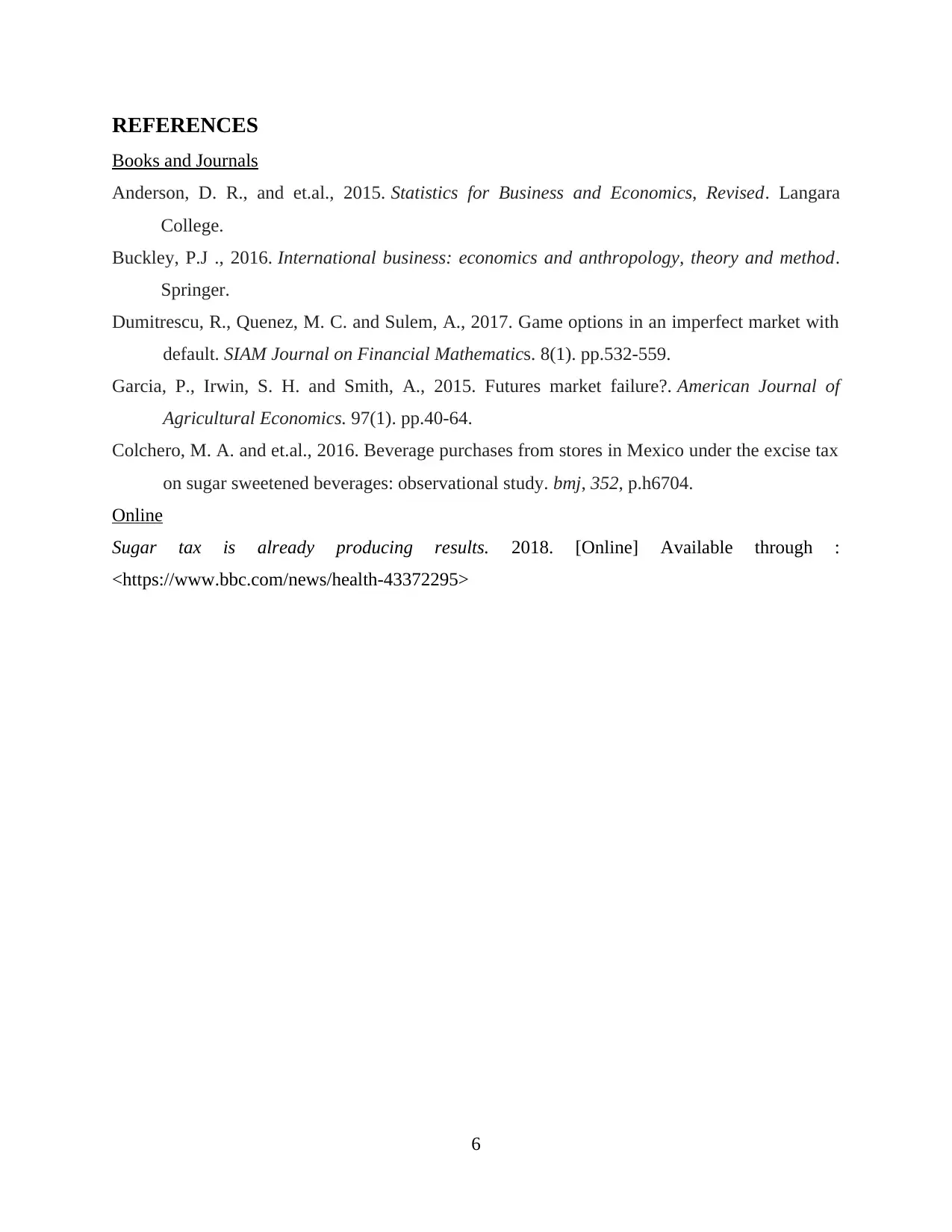
REFERENCES
Books and Journals
Anderson, D. R., and et.al., 2015. Statistics for Business and Economics, Revised. Langara
College.
Buckley, P.J ., 2016. International business: economics and anthropology, theory and method.
Springer.
Dumitrescu, R., Quenez, M. C. and Sulem, A., 2017. Game options in an imperfect market with
default. SIAM Journal on Financial Mathematics. 8(1). pp.532-559.
Garcia, P., Irwin, S. H. and Smith, A., 2015. Futures market failure?. American Journal of
Agricultural Economics. 97(1). pp.40-64.
Colchero, M. A. and et.al., 2016. Beverage purchases from stores in Mexico under the excise tax
on sugar sweetened beverages: observational study. bmj, 352, p.h6704.
Online
Sugar tax is already producing results. 2018. [Online] Available through :
<https://www.bbc.com/news/health-43372295>
6
Books and Journals
Anderson, D. R., and et.al., 2015. Statistics for Business and Economics, Revised. Langara
College.
Buckley, P.J ., 2016. International business: economics and anthropology, theory and method.
Springer.
Dumitrescu, R., Quenez, M. C. and Sulem, A., 2017. Game options in an imperfect market with
default. SIAM Journal on Financial Mathematics. 8(1). pp.532-559.
Garcia, P., Irwin, S. H. and Smith, A., 2015. Futures market failure?. American Journal of
Agricultural Economics. 97(1). pp.40-64.
Colchero, M. A. and et.al., 2016. Beverage purchases from stores in Mexico under the excise tax
on sugar sweetened beverages: observational study. bmj, 352, p.h6704.
Online
Sugar tax is already producing results. 2018. [Online] Available through :
<https://www.bbc.com/news/health-43372295>
6
1 out of 8
Related Documents
Your All-in-One AI-Powered Toolkit for Academic Success.
+13062052269
info@desklib.com
Available 24*7 on WhatsApp / Email
![[object Object]](/_next/static/media/star-bottom.7253800d.svg)
Unlock your academic potential
Copyright © 2020–2026 A2Z Services. All Rights Reserved. Developed and managed by ZUCOL.




